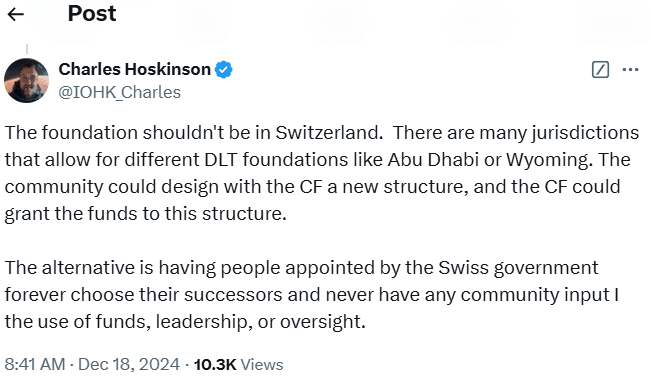Charles Hoskinson, the founder of Cardano, raised concerns that the Cardano Foundation should move its legal base from Switzerland.
In the recent discussion on the X, Hoskinson said that Switzerland’s legal system limits community involvement in decision-making, particularly in election board members.

Hoskinson suggested that the company should relocate its governance structure to jurisdictions like Abu Dhabi or Wyoming, known for their blockchain-friendly regulations.
As per him, locations like Abu Dhabi or Wyoming would offer better opportunities for the community to have a say in governance, leadership, fund usage, and deep insights.
Hoskinson pointed out that under Swiss governance laws, the process of appointing board members is controlled internally, with no direct input from the Cardano community. He warned that this system could lead to a lack of accountability, where board members choose their successors indefinitely without community oversight.
He proposed a new structure where the Foundation could collaborate with the community to design a governance model that includes democratic principles. In such a structure, the Foundation could transfer its funds to the new setup, ensuring that decision-making is transparent and community-driven.
This discussion gained traction after the Cardano Foundation’s official account on X was hacked, raising questions about the organization’s security and transparency. People in the Cardano community have since called for reforms to ensure the Foundation operates in a manner, prioritizing inclusivity and accountability.
Some Cardano enthusiasts have echoed Hoskinson’s concerns, criticizing the Swiss legal framework for being too rigid and excluding the community from governance. While Swiss bylaws provide legal protections and compliance, they lack the flexibility needed for broader community participation.
Charles Hoskinson’s recent comments follow a post by the Cardano Foundation addressing governance concerns. The Foundation promised transparency and announced open discussions, starting with a virtual forum featuring CEO Frederik Gregaard.
In this post, the Foundation emphasized its commitment to transparency, highlighting efforts like launching financial insights reports and on-chain audited statements to complement its annual activity report.
However, Hoskinson feels these steps fall short and is calling for a new decentralized structure that aligns with blockchain principles.
While many in the crypto community support his proposal as a step toward greater decentralization, critics point out the challenges of fair elections and effective governance. This debate has gained momentum, especially after an anonymous whistleblower’s post about the Foundation surfaced.
Also Read: Bitcoin’s DeFi Growth Could Eclipse Ethereum, Says Hoskinson







